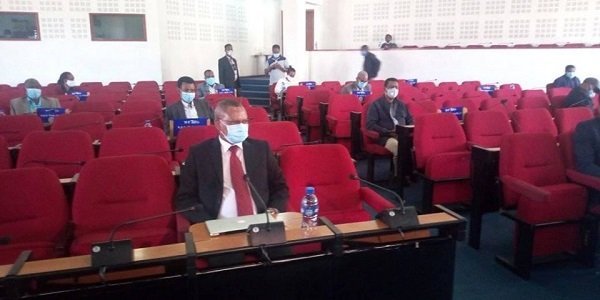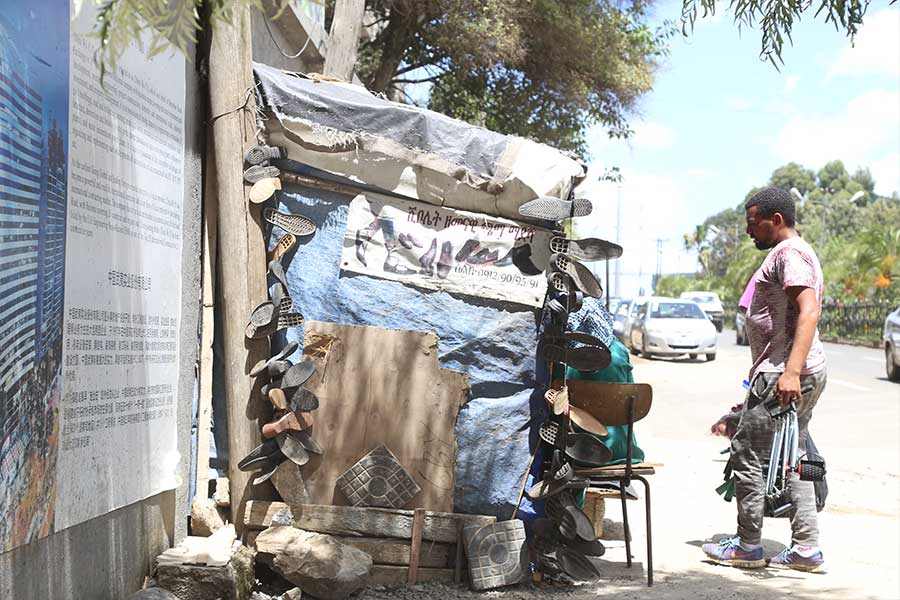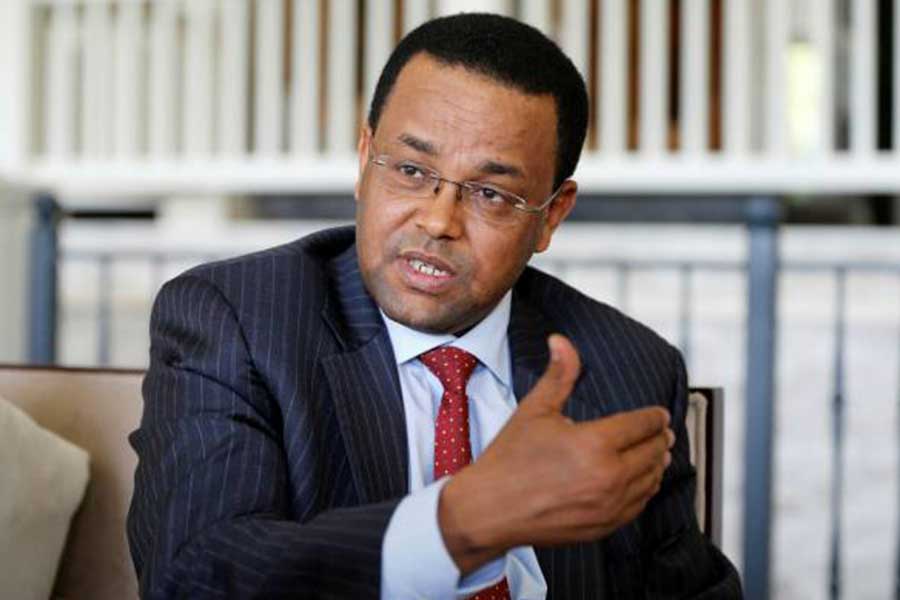
Covid-19 | Apr 11,2020
A network of cobblestone roads in the capital is undergoing maintenance, a city government project that covers a fraction of these roads and delayed by almost a year.
With a budget of 30 million Br, the Addis Abeba City Roads Authority (AACRA) wants to see the repairs of no less than 50Km of these roads completed in the next two months. Many of the cobblestone roads laid in the neighbourhoods across the city since the mid-2000s are in shoddy condition due to construction failures and damage from infrastructural works.
Cobblestone roads were introduced as a pilot project in Dire Dawa in 2005 after its officials visited the Netherlands. As a result, a massive scale of cobblestone roads was put up over the last 15 years almost in every urban setting in the country, as the government of the EPRDF saw business opportunities for micro and small business that provided labour-intensive jobs. However, scant attention was given to the maintenance and upgrading of these roads.
Officials at the city`s job bureau have selected a little over 110 small enterprises to carry out the maintenance work now, providing job opportunities for over 2,200 people, three times the labour force hired for the construction of the city's most expensive road project from Pushkin Square to Gotera Interchange, in Nifas Silk Laphto District. Costing the city administration 104 million dollars for a kilometre, the 3.8Km road is the second most expensive in Addis Abeba, following the Africa Avenue road, from Mesqel Square to Bole International Airport.
The enterprises, the same companies hired two years ago to build some of the cobblestone roads, have completed the rehabilitation of 10Km, while work on the remaining roads is expected to be carried out over the next two months. However, representing less than three percent of the 2,665Km, the maintenance of these roads has been delayed by almost a year. Officials at the roads Authority blame the COVID-19 pandemic and organisational problems with the Community Engagement Coordination Agency under the city administration. The latter was only reactivated last year.
"We didn't know which cobblestone roads needed maintenance," admitted Addisu Assefa, head of the planning, budget, and strategic management directorate at the City Roads Authority.
The Community Engagement Coordination Agency was dissolved in 2019 by the City Administration, only to be re-instituted the following year. The Agency consists of almost 7,000 councils spread throughout the city's 11 districts, with its main purpose being to survey roads and report damages or irregularities to the authorities. Asfaw Legese serves as head of the Agency and recalled reporting damages to 83,000sqm cobblestone roads that needed maintenance at the beginning of the year.
"A little late because we were busy with community work for COVID-19," he told Fortune.
Though some of the damage to the cobblestone roads can be attributed to regular wear and tear, city authorities believe much of it was caused by avoidable factors such as poor infrastructure planning and substandard construction work.
"Cobblestone roads can last for over 100 years," said Eyasu Solomon, director for communications at the Authority. "It isn`t the case in Ethiopia."
With a unit width of around seven centimetre to 25cm, cobblestones have dominated road surfaces in Europe for a century due to their longer lifespan and reduced maintenance requirements. The opposite is true in Ethiopia, according to Eyasu.
"They have a short lifespan largely due to a lack of skilled manpower in the construction process," he told Fortune. "Excavation work done for other infrastructural works such as telecom, water and sewerage, and electric lines; as well as a lack care from drivers is also part of it."
The payment process for the damage of roads due to infrastructure excavation is now under the City Infrastructure Development Coordination & Construction Permit Control Authority, and this will hopefully solve some of the issues, according to Eyasu.
"We're working to improve quality assurance in the construction of the roads, but it doesn't mean there won't be any need for maintenance in the future," said Eyasu.
For Abebe Dinku, professor of Civil Engineering at the Addis Abeba University Insitute of Technology, this does not cut it as a long-term solution.
The construction of cobblestone roads was carried out "under the disguise" of creating job opportunities, while the issue of quality and the importance of conducting pre-feasibility studies has been overlooked before embarking on the project, according to him.
"It looks like we're in a vicious circle with the city administration yet again repairing the damaged cobblestone roads without conducting a proper study to check whether or not it fits localities in the capital," Abebe told Fortune.
Adding to the maintenance work, the Authority is constructing new cobblestone roads with a budget of 139 million Br.
PUBLISHED ON
Jun 05,2021 [ VOL
22 , NO
1101]

Covid-19 | Apr 11,2020

Covid-19 | Aug 08,2020

Fortune News | Apr 03,2021

Radar | May 16,2020

Radar | Feb 22,2020

Editorial | Jul 31,2021

Sunday with Eden | Jul 25,2020


Fortune News | Aug 16,2020

Commentaries | Feb 01,2020

Dec 22 , 2024 . By TIZITA SHEWAFERAW
Charged with transforming colossal state-owned enterprises into modern and competitiv...

Aug 18 , 2024 . By AKSAH ITALO
Although predictable Yonas Zerihun's job in the ride-hailing service is not immune to...

Jul 28 , 2024 . By TIZITA SHEWAFERAW
Unhabitual, perhaps too many, Samuel Gebreyohannes, 38, used to occasionally enjoy a couple of beers at breakfast. However, he recently swit...

Jul 13 , 2024 . By AKSAH ITALO
Investors who rely on tractors, trucks, and field vehicles for commuting, transporting commodities, and f...

Oct 11 , 2025
Ladislas Farago, a roving Associated Press (AP) correspondent, arrived in Ethiopia in...

Oct 4 , 2025
Eyob Tekalegn (PhD) had been in the Governor's chair for only weeks when, on Septembe...

Sep 27 , 2025
Four years into an experiment with “shock therapy” in education, the national moo...

Sep 20 , 2025
Getachew Reda's return to the national stage was always going to stir attention. Once...